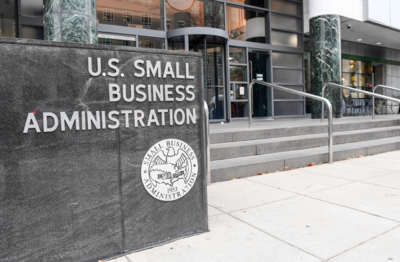
Did pandemic emergency loans reach minority small business, and will the next round?
For one look at whether minority owned small businesses have benefitted so far, Federal Drive turned to Creative Investment Research economist and principal Wil...
Best listening experience is on Chrome, Firefox or Safari. Subscribe to Federal Drive’s daily audio interviews on Apple Podcasts or PodcastOne.
President Biden a couple of weeks ago promised that the latest big spending bill, which includes some pandemic relief, would better reach small businesses with loans than earlier legislation. For one look at whether small businesses, and especially minority owned ones, have benefitted so far, Federal Drive with Tom Temin turned to Creative Investment Research economist and principal, William Michael Cunningham.
Interview transcript:
Tom Temin: Mr. Cunningham, good to have you back.
William Michael Cunningham: Thank you very much Tom, I’m delighted to be back.
Tom Temin: And so what’s your perception? What’s your research showing you whether the first round, I guess the CARES Act money, in fact was able to reach minority owned and otherwise struggling small businesses?
William Michael Cunningham: Well, we’ve done a lot of research in that area. Back in April, May, we launched a survey that asked minority businesses, African American businesses in particular, about their experience with the PPP program, and it wasn’t good. It was not reaching the African American business community in particular, they didn’t approach it right. They tried to get the money out by using the old bureaucratic infrastructure at the SBA. And the problem with that is that those are really rules based types of efforts where they really focus on the bureaucratic rules — you got to have this forum, you got to do this, you got to cross this team, you got to do this. And those don’t work under the best of economies, and in the best of circumstances, for minority businesses, we know that. And then you add an existential crisis that we haven’t seen before. On top of that, no, there was no way that that was going to work simply because of the bureaucratic infrastructure that was in place to allocate those funds, you need a more flexible and adaptive type of approach in this type of crisis, to really save those businesses. Now, this looks like what Biden has proposed. So I was delighted to see the changes that were announced by the president in the program far more responsive, I think this new approach is going to do a far better job of getting capital to black businesses.
Tom Temin: And I want to get to that approach in just a moment. But let me challenge you on one point, if you have very small businesses, and they could be in urban areas or rural areas, I’m thinking of barber shops, types of places that really did have a dry up of their customers, or small restaurants — could the issue with access to the websites and to all of the bureaucratic rigmarole that you mentioned — could that be a function of size and relative, I don’t know, wealth of the community more than a function of racial background?
William Michael Cunningham: Well, that’s a good question. And I think I see where you’re going. And the answer is no, it’s a function of race and discrimination in the structure of the economy. I mean, one of the things that this crisis reveals is the depths to which black people in particular are victimized by the structure of this economy. Everything is structured to keep economic resources away from a certain population. So no, I would say based on my research, I would say no race is the key determinant factor there. Now, the good news is that we’ve begun to honestly approach that, just begun, and this is why the changes that Biden made to the program are so positive and so hopeful, from my perspective, because at least they start to honestly look at those issues.
Tom Temin: And what are the changes that are coming in this new bill, presuming it gets promulgated and passed and so forth, that you feel will make that difference?
William Michael Cunningham: Well, one of the things that Biden announced on February 22 was that he was changing the PPP program to really focus on solo entrepreneurs, businesses with one, two, three, five employees. And really, for black businesses in particular, it’s the businesses with one or two employees that are critical, not the businesses, as the President said. With 500 employees., or with a thousand employees, those are important. They’re great, hope they continue. But if you really are going to focus the Paycheck Protection Program in a way that maximizes social return for the African American business community, then you’re going to focus on solo entrepreneurs, one/two person types of businesses. So that’s the absolute key part of this and remember what I said about the bureaucratic infrastructure of the SBA, they are not structured to provide resources to a one person business. They just start that’s just not their thing, they’re focused on businesses that that have 500 employees or 200 employees or 100 employees, anything but that solopreneur.
Tom Temin: And the President did mention in that same speech, the use of community organizations, he didn’t otherwise elaborate. What types of organizations do you feel he was referring to or do you think could fit that bill?
William Michael Cunningham: I’m gonna say something unpopular here. But I can back it with facts, I can back up with facts — and it directly addresses your question. So in 2001, we were looking at predatory lending in the African American community in Minneapolis, Minnesota, and the issue is their financial institutions coming in changing the terms of the loans, making bad loans. You take out a loan, and then the interest rate jumps up to 15%. And you default on it and you lose your house. So what we did was we got the state of Minnesota to extinguish legally the old predatory loans based on the fact that they were based on fraud. And then we worked with a bank and with Fannie Mae to write new 30 year fixed rates, non predatory loans, which we then pulled into a Fannie Mae security and purchased at the pension fund that I was working for at the time. And this was 2001, mind you. And by the way, if we had been able to adapt that process to the country overall in 2007/2008, the financial crisis would not have been anywhere near, and that’s a $19 trillion problem by the way, that had we been able to utilize community based organizations to identify the victims of predatory loans, extinguish those loans, write new non predatory loans, put them into pools — we would have been able to eliminate that issue. So it is here, a unique community group to do justice in Minneapolis, Minnesota, identify the solopreneurs, so the one or two person businesses in the community,
Tom Temin: Because of the case of the SBA, you’re going to have a federally financed loan program through the SBA. So none of those predatory practices are even possible from the SBA. They can’t ask you what color you are, they can’t make any sort of discrimination. So I guess the service then would be for these community groups to find the businesses and bring them to the SBA website, so to speak.
William Michael Cunningham: That’s correct. So the SBA with respect to PPP needs to find community organizations that can do that effectively. So this is the issue with respect to SBA, the new iteration of PPP, and African Americans and minority businesses in general. If you’re going to use community partners, then you have to find authentic, effective engaged community partners, not people who are doing it for the money
Tom Temin: And the $15 federal hourly wage, that doesn’t look like it’s going to be in this particular bill, and so they’re devising other strategies. Does that help or hurt?
William Michael Cunningham: Oh, a $15 federal minimum wage helps, helps helps. It is the key national policy that could significantly improve the lives of the maximum number of certainly minority.
Tom Temin: So why not 25?
William Michael Cunningham: 25 is too much. I don’t know. I mean, you have to limit it. So why not $200, you have to limit it somewhere. And $15 from our research seems about right. When you look at two things where the minimum wage is right now, and the last time that it was significantly increase.
Tom Temin: William Michael Cunningham is an economist and principal at Creative Investment Research in Washington. Thanks so much as always.
William Michael Cunningham: Thank you for the time, I really appreciate it.
Copyright © 2024 Federal News Network. All rights reserved. This website is not intended for users located within the European Economic Area.
Tom Temin is host of the Federal Drive and has been providing insight on federal technology and management issues for more than 30 years.
Follow @tteminWFED





